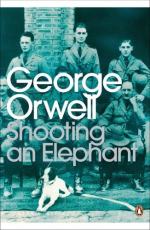|
This section contains 429 words (approx. 2 pages at 400 words per page) |

|
At the very beginning of "Shooting an Elephant," Orwell notes that during his tenure as a colonial policeman in Burma many people hated him. Furthermore, as a writer of nonpartisan political criticism (paying equal attention to the strengths and weaknesses of all sides), Orwell attracted, and still attracts, his share of personal attacks. As Paul Johnson notes in Intellectuals (1988), "Orwell had always put experience before theory," and when experience showed that the political Left, with which he had previously identified himself, was just as capable of error as the Right, he said so. Thus the critical tradition concerning Orwell's work generally and his politically charged writings, including "Shooting an Elephant," is controversial.
Readers can glean a sense of how those who favor Orwell tend to treat him from Paul Johnson's remark that, for Orwell, "human beings mattered more than abstract ideas." The general position of those...
|
This section contains 429 words (approx. 2 pages at 400 words per page) |

|




